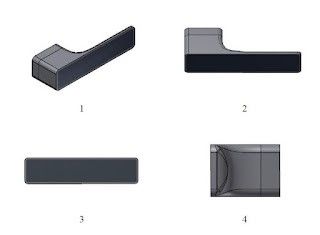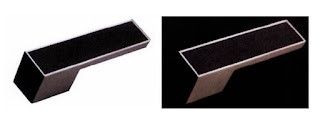Industrial designs can be registered in South Africa and there is, in fact, provision for the registration of both aesthetic and functional designs. Yet, there is surprisingly little design law litigation in South Africa and, as a result, not a great deal of case law to guide us. We therefore like to look at developments in other parts of the world from time to time, particularly in the UK and the EU.
The design that we will be discussing relates to door and window handles. In 2012, a company (the predecessor to a company called M&T 1997) applied for a Registered Community Design ("RCD") for door and window handles which was granted on 27 November 2017.
The four shapes appear below:

Possible invalidity
In 2020, a company called VDS Czmr Kowalik sp.k ("VDS") applied to have the RCD declared invalid. This application was based on alleged 'lack of individual character', as per Article 25(1)(b) Community Design Regulation. In support of this claim, VDS relied on earlier registrations, including the two shapes below:

EUIPO
The Cancellation Division of EUIPO agreed that the RCD should be declared invalid. It based its findings on the fact that the RCD produced the same overall impression as the earlier design. The matter was taken up a step to the Board of Appeal.
The Board of Appeal
The Board of Appeal agreed that the RCD should be declared invalid. The matter was taken up to the next level.
The General Court
The General Court reversed the decision of the Board of Appeal, holding that the RCD was valid. The court went through the various steps:
Relevant sector
The General Court made it clear that the door and window handle sector was the relevant sector for this enquiry.
Informed user
In design law, the notional 'informed user' is considered. The General Court made the point that the 'informed user' lies somewhere between the 'average consumer' and the 'sectoral expert', who has detailed technical expertise.
The General Court went on to say that the informed user is observant, attentive, and knows the designs that exist in the particular sector. The General Court further made the point that a salesperson would not be regarded as an informed user and that the informed user is neither an expert nor a specialist.
Designer's degree of freedom
The General Court held that when it comes to door handles, the designer's degree of freedom is high. That's because a door handle can be made in a variety of shapes, colours and materials.
Comparison
The General Court dealt with various issues:
Overall impression and informed user: The individual character of a design results from an overall impression of difference from the point of view of an informed user about any earlier design. The comparison of the overall impressions should go beyond an analytic comparison of a list of similarities and differences.
- Normal use: Overall impression must be judged with regard to normal use of the product – in use, the informed user will focus on the most visible and important elements of the product.
- Design award: The fact that M&T's RCD had received an international design award (Red Dot) was irrelevant because this did not say anything about the overall impression made by the design on informed users.
Conclusion
The General Court concluded by finding that there were several differences between M&T's design and VDS's earlier registrations and that these differences were sufficient to produce a different overall impression. The RCD was therefore valid!
Looks are not everything... even in design matters
The content of this article is intended to provide a general guide to the subject matter. Specialist advice should be sought about your specific circumstances.


